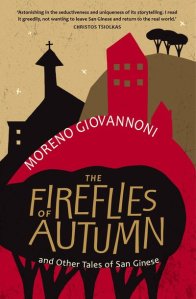I don’t usually report on prizes for unpublished writing because you and I can’t yet buy the books, but one of my favourite soapbox topics is the issue of migrant writing, and the newly established Deborah Cass Prize is one that’s dear to my heart. It was set up to help emerging migrant writers towards publication: the winner receives $3000 and a three-month mentorship, plus an introduction to Black Inc publishers and an opportunity to be published in the Mascara Literary Review.
The Prize honours the life and work of the late legal academic and occasional writer, Deborah Cass. The granddaughter of Jewish immigrants, Deborah became a prize-winning professor of International Law at the London School of Economics before her death to cancer in 2013. (Deborah Cass Prize for Writing website).
 Not long ago I had the pleasure of reading the book that emerged from the first year of the prize in 2015: it was The Fireflies of Autumn by Moreno Giovannoni, and I loved it. (See my review here). (Melanie Cheng was shortlisted that year too, and her collection of short stories, Australia Day was picked up by Text and subsequently shortlisted in the Victorian Premier’s Award for Fiction).
Not long ago I had the pleasure of reading the book that emerged from the first year of the prize in 2015: it was The Fireflies of Autumn by Moreno Giovannoni, and I loved it. (See my review here). (Melanie Cheng was shortlisted that year too, and her collection of short stories, Australia Day was picked up by Text and subsequently shortlisted in the Victorian Premier’s Award for Fiction).
You can read ‘Almitra among Ghosts’ by the 2017 winner Rafeif Ismail here.
Will there one day be a book in our hands by one of these aspiring authors on the shortlist?
- Shannon Anima (Canada) “Bread of the dead”
- Lyn Dickens (Singapore) “The resurrection of Tuesday Goodman”
- Zoe Ghani (Afghanistan) “Pomegranate and fig”
- Karina Ko (China) “Things I used to believe”
- Nasrin Mahoutchi-Hosaini (Iran) “Taking care of eggs”
- Aline-Mwezi Niyonsenga (Rwanda) “Fell our selves”
- Marianna Shek (China) “The lady on the dark side of the moon”
- E Sun (Malaysia, Vietnam, China) “Maybe it’s Wanchai”
- Su-May Tan (Malaysia) “The origin of things”
The winner will be announced on December 5th.


I also enjoy migrant literature and that’s a great prize! Is this prize for Australians only? None of the listed books is available here although a couple of the authors have had prior works published here. We have a lot of migrant lit, too – our Pulitzer Prize in fiction have been won by immigrant authors, Jhumpa Lahiri and Junot Díaz.
LikeLike
By: Becky on November 14, 2018
at 10:27 am
Hi Becky, I haven’t delved into the criteria but my guess is that it is Australians only, because it’s only just gone national in the last year.
IMO Australia came a little late to the Migrant-Lit party: we’ve all been reading Anglo-English books from Britain for a long time, and as you say, from America too. But it wasn’t until the 2000s that a writer of migrant origin won our major prize (I don’t count the fraudulent one who pretended to be Ukrainian and won it in 1995). However (as you will see if you visit my Diversity page in the top menu) things are improving and the value of this prize is that it helps writers to get their work in shape when English is not their first language and they may be writing from a tradition we don’t easily recognise.
The Enlightenment of the Greengage Tree by Shokoofeh Azar (https://anzlitlovers.com/2017/08/01/the-enlightenment-of-the-greengage-tree-by-shokoofeh-azar-translated-by-adrien-kijek-bookreview/) is an example of that – it was translated from the Persian too, and I’d love to see a prize that offers translation into English as part of the award… as Azar’s book shows, that would give us an entirely different kind of writing which would be lovely to see. Sometimes migrant writing (like other kinds of writing) is a case of ‘getting things off the chest’ (discrimination, feelings of not belonging anywhere etc) which is valid and important, but there’s a limit to how many of them one might to read and what the market will bear. However IMO there’s also a place for telling other kinds of stories, ones that reflect a heritage with a distinctive storytelling style and a way of looking at the world.
LikeLike
By: Lisa Hill on November 14, 2018
at 10:46 am
The Fireflies of Autumn looks good I had not heard of it.
LikeLike
By: TravellinPenguin on November 15, 2018
at 9:46 am
It’s excellent, I loved it:)
LikeLiked by 1 person
By: Lisa Hill on November 15, 2018
at 10:27 am
Sounds like a great initiative and a good way to encourage diversity in Australian literature.
LikeLiked by 1 person
By: kimbofo on November 16, 2018
at 7:54 pm